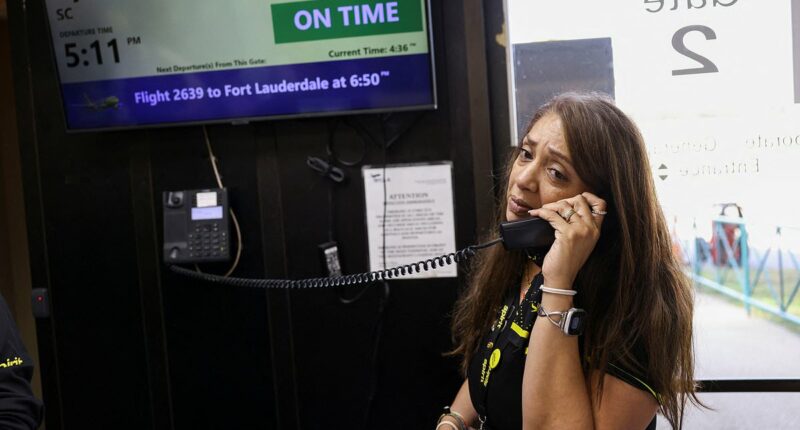Share this @internewscast.com
Latrobe, Pennsylvania — hometown of golf legend Arnold Palmer — faces being cut off from the rest of the country as Spirit Airlines slashes flights.
The town’s airport, named in Palmer’s honor, is the only commercial link connecting locals to the wider world.
Spirit, known for its bright yellow planes, filed for Chapter 11 bankruptcy in August for for the second time in a year.
Then last week, it announced plans to reduce flight capacity from November by 25 percent while furloughing one-third of its flight attendants.
Loss-making routes face the axe, and Latrobe residents fear flights from Arnold Palmer Regional Airport fall into that category.
Gabe Monzo, Westmoreland County Airport Authority’s executive director in southwestern Pennsylvania, commented, “We have 150,000 people eager to travel.”
If Spirit slashes service to Latrobe, ‘It would be a real deficit to air transportation here,’ Monzo told Reuters.
The next closest airport is all the way in Pittsburgh — about 65 miles away from Latrobe, which is in Westmoreland County.

There is rising concern among East Coast town residents that they could become isolated due to Spirit Airlines’ recent financial troubles and cost-cutting measures.

The small town of Latrobe, PA, heavily relies on Spirit Airlines as it is the sole commercial carrier operating from Arnold Palmer Regional Airport.

A Spirit Airlines flight arrives at Arnold Palmer Regional Airport in Westmoreland County, PA, as airport staff handle the luggage on the tarmac.
The relationship between Spirit and Arnold Palmer airport is distinct, with Westmoreland County investing around $900,000 each year to back Spirit’s activities, at a facility that primarily caters to private aviation.
Monzo noted, “When Spirit decided to establish operations here, our airport was limited in its capabilities and unsuitable for commercial flights, but we managed to transform it.”
‘I fly Spirit all the time,’ said Darlene Wommer, who was waiting to board a flight to Myrtle Beach, South Carolina, to visit her father. ‘I’m going to miss it a lot if it goes.’
Discount airlines have struggled since the pandemic, and many have been trying to go up-market.
Spirit Airlines filed for Chapter 11 bankruptcy protection in August for the second time in a year after failing to make significant changes during its first attempt.
Based in Florida and known for its bright yellow planes, Spirit first filed for bankruptcy protection last November after years of losses, failed merger talks, and heavy debt.
It was the first major US airline to seek Chapter 11 since 2011. The airline emerged from bankruptcy in March after creditors approved its restructuring plan and wiped out all existing shares, hitting ordinary investors.
Ownership was handed to Spirit’s lenders, which include investment funds managed by firms such as Citadel Advisors.

America’s other ultra-low cost carriers are Frontier and Sun Country, while Southwest, JetBlue and Allegiant are also budget airlines but considered more customer-friendly

Spirit’s CEO Dave Davis (pictured) said the airline’s actions are a ‘proactive step to build a stronger foundation and future for our company’
Spirit now carries $2.4 billion in long-term debt, most due in 2030, and reported a negative free cash flow of $1 billion at the end of the second quarter.
Last month, Spirit furloughed 270 pilots and demoted another 140 as part of efforts to save money.
Spirit recently rejected a proposed takeover by fellow budget airline Frontier, saying the proposed buyout offered less value for Spirit’s creditors than the bankruptcy restructuring.
Spirit has been struggling with losses and declining revenue since the pandemic.
In fact, while it may have made profits some quarters, it has not turned an annual profit since even before the pandemic.
Frontier Airlines and Spirit Airlines first planned to merge in 2022, then but JetBlue Airways swooped in with a higher bid. That won over Spirit’s shareholders.
Spirit executives saw the merger with JetBlue as a way to claw back a market share, but the Department of Justice argued that such a deal would violate anti-trust laws, and a judge agreed.
As a result, JetBlue pulled out of a merger agreement.
Meanwhile, in December Silver Airways also filed for Chapter 11. The airline flies to vacation hotspots across Florida and the Caribbean – prompting fears for the fate of trips planned by Americans looking for winter sun.
















